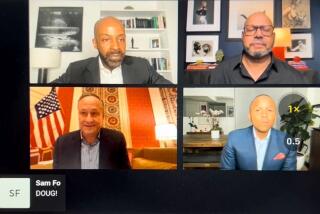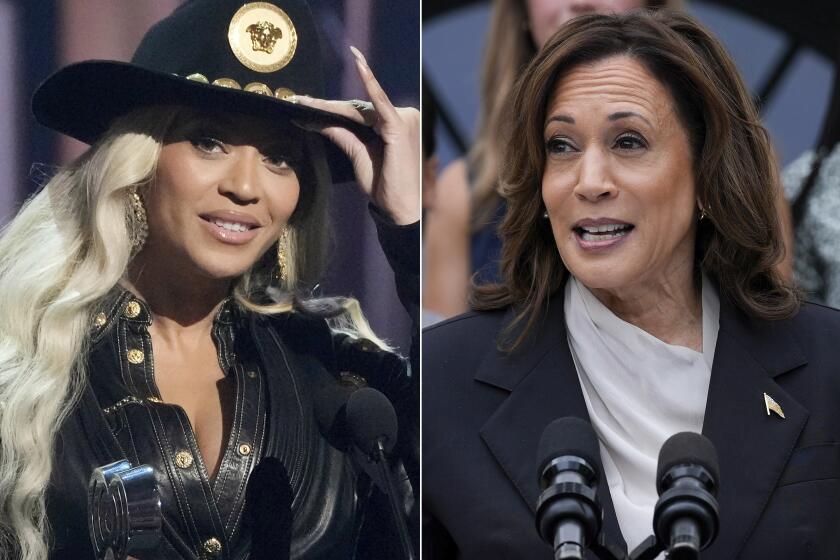Tax Policy Moderates Seem to Have Gained Upper Hand
Only days before President Bush is set to deliver his election-year State of the Union address, a quiet struggle has broken out between conservative activists who want Bush to embrace sweeping new tax breaks and moderates who advocate a more cautious approach of seeking to consolidate his tax cut victories of the last three years.
Early indications are that the moderates are carrying the day.
For months, activists and some Republican Party officials have pushed for Bush to embrace the notion of an “ownership society” -- a set of tax reduction and related policies aimed at helping Americans build assets, from homes to tax-advantaged savings and brokerage accounts. These activists have argued that the theme plays well with voters, helps explain the administration’s tax-cut-heavy policies, and could usher in a generation of GOP political dominance.
But in his first full-dress speech of the election season -- Tuesday night’s televised address to a joint session of Congress -- the president will not use the phrase or mention the tax breaks the conservatives have touted, a senior White House official said Thursday.
“I’d steer you ... away from ‘ownership society,’ ” said the official. “I don’t want you to believe it’s not important, but I wouldn’t describe the speech that way.”
The official said the administration would include one of the tax breaks conservatives have been promoting -- for retirement savings -- in its fiscal 2005 budget plan, due out in two weeks. But he made no mention of two others -- for so-called lifetime savings accounts and for a new employer-based retirement savings account.
Activists such as Grover Norquist, president of Americans for Tax Reform, said word of the White House decision not to use the phrase “ownership society” or include mention of the tax breaks hardly ends the matter.
Contradicting the White House official, Norquist said he had been assured that the proposals for retirement savings, lifetime savings and new employer-based retirement accounts would be in the budget.
“This gives us the maneuvering room we need. We will make this an issue,” he said. Norquist is thought to have the ear of Bush political advisor Karl Rove and is considered widely influential in Washington.
Nevertheless, the decision appears to be a substantial setback for conservatives.
And it suggests that the president and his aides are settling on a cautious approach to the upcoming campaign rather than adopting a broad, new theme that might carry the GOP through a second Bush term and beyond.
Instead of adopting the more aggressive tax agenda, White House officials say the administration’s main push in the coming months will be to make the tax cuts it has won in the past three years permanent.
Only three weeks ago, Bush seemed to pick up on the conservatives’ “ownership society” theme when he declared at a bill-signing ceremony that his administration would “constantly strive to promote an ownership society in America.” Norquist and others confidently predicted that the tax breaks they sought would be at the center of the Bush reelection campaign.
But this apparently was before senior White House officials began scrutinizing the “ownership society” agenda and discovered that key elements of it had become entangled in a nasty, behind-the-scenes fight.
The fight pitted activists against such heavyweights as the life insurance industry and Republican congressional leaders like Rep. Rob Portman of Ohio, who fear the lifetime savings account in particular could divert assets away from 401(k) retirement plans and other employer-based savings arrangements that are mainstays of American investment.
Critics of the new tax breaks do not want to undermine the existing employer-based savings plans, which they say are easier to market than individual accounts and provide a convenient mechanism for workers to set aside savings.
The new fight over the accounts represents only the most recent trouble for the proposed tax breaks, which were devised by the Treasury Department and abruptly announced early last year, apparently with little input from the White House, before being promptly dropped.
As originally envisioned, the retirement savings account would permit Americans at all income levels to contribute as much as $7,500 a year per account. Although people would not get a tax break for contributing, as they do with 401(k) plans and traditional IRAs, all interest, dividends and capital gains earned on the contributions would be tax-free at retirement.
The White House official said this proposal would be in the budget in some form.
The lifetime savings accounts would be similar, but people would be allowed to withdraw from the accounts at any time for any purpose. Critics warned that these plans could undermine the government’s current system, which rewards long-term retirement savings, by having such lax rules that there would be little incentive to save using any other accounts but these.
Portman said Thursday that although he supported expanded tax breaks for retirement savings, he objected to the lifetime savings accounts. “We should encourage long-term savings, especially by the baby boomers for their retirement, not short-term savings,” he said.
The employer-based retirement savings accounts would consolidate the variety of existing tax-break-driven accounts offered by employers, such as 401(k) plans.
“The president would like to tap into the ownership society idea,” said commentator Norman J. Ornstein with the generally conservative American Enterprise Institute. “But there are a lot of Republicans who are concerned that ownership society could easily segue into an aggressive pitch for Social Security private accounts, which has been an area of some turbulence for the GOP.”
Times staff writer Doyle McManus contributed to this report.
More to Read
Get the L.A. Times Politics newsletter
Deeply reported insights into legislation, politics and policy from Sacramento, Washington and beyond. In your inbox three times per week.
You may occasionally receive promotional content from the Los Angeles Times.






